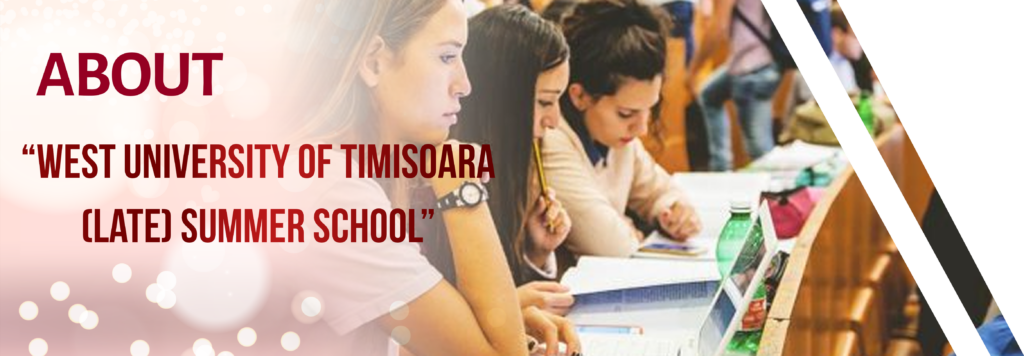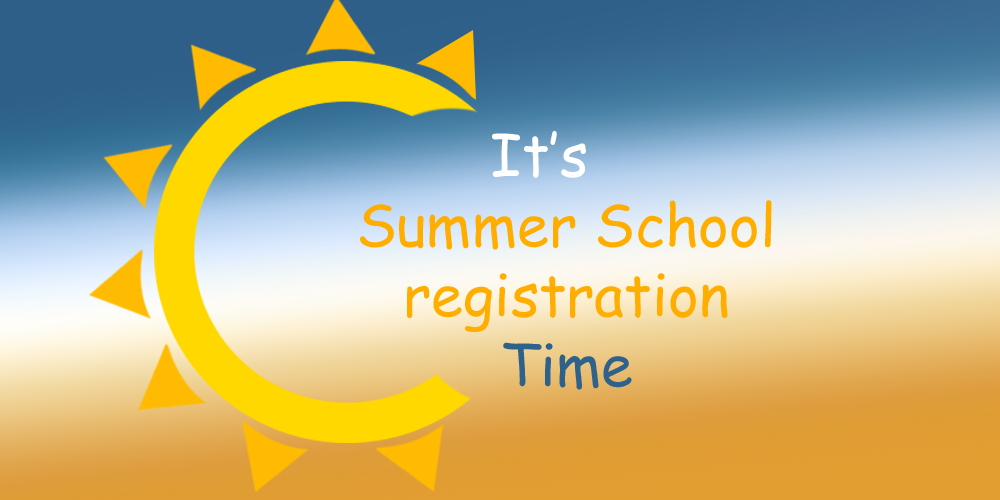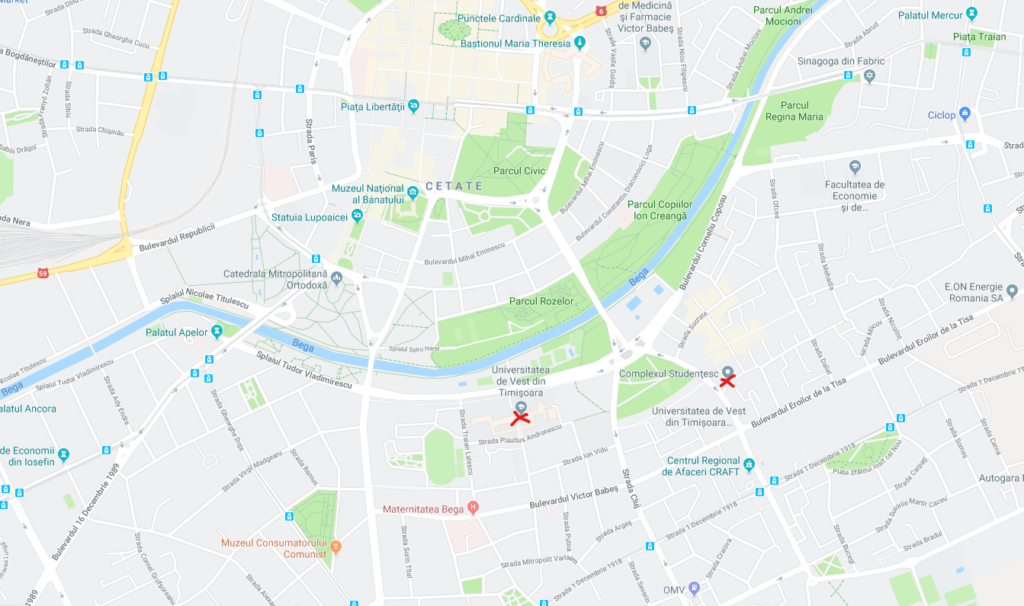About “West University of Timisoara (late) Summer School” - 1st Edition

The West University of Timișoara (Late) Summer School has extended its deadline until the 25rd of August 2019! Feel free to apply and we are looking forward to meeting you soon!
About “West University of Timisoara (late) Summer School” Our Summer School will be taking place, as the name suggests, at West University of Timisoara, which is located in the city of Timisoara, 2021 European Cultural Capital. The period in which the Summer School will be taking place is beginning with the 31 st of August, up until the 13 th of September. Our Summer School seeks to be an inter and multi-disciplinary one. On top of everything, all students are welcome – national or international, Bachelor or Master level, for the 70 places available. If you’re looking for the best way to spend your last days of summer, you’ve come to the right place!
→ Registration kit and course materials
→ Two weeks of unique, interesting courses in various subject areas
→ Workshops on a variety of topics, perfect for improving personal skills, such as: Public Speaking, Introduction to Romanian Language, or Intercultural Skills
→ Free accommodation in the University’s campus for the whole period of time
→ One free access pass for a touristic objective of the 2021 European Capital of Culture, Timișoara
→ A “Welcome to West University of Timișoara (Late) Summer School” Lunch, to meet and greet your future colleagues, as well as all the lunches during all “school days” (Monday to Friday)
→ A Farewell Dinner, to have a chance to bid your new friends farewell
→ A plethora of fun extracurricular activities to get to know the city and its surroundings better
The courses we are offering this year are the following:
The course proposes an integrated study of environmental law, by emphasizing the interaction between the right to environment (the legal setting) and the value of environment (the social and political context in which the right emerges and operates). It looks beyond legal issues and encourages a critical examination of the system and proposals for reform.
The course will be divided into four parts: Part 1. Environment as an object of legal protection, and how environmental protection evolved through time.
Part 2. Analysis of the case of Roșia Montană, for an empirical evaluation of how individuals, the commercial sector, governments, and international organizations value the right to environment.
Part 3. The right to environment – a right impregnated with our calculations on the value of environment, valuations which play a major role in the development of environmental law.
Part 4. In which ways can law be used as a tool to enhance the value of environment, and, accordingly, local and global environmental protection?
Assessment Essay (100%, 2000 words).
By Prof.univ.dr.Dumitru N. Vulcanov
Starting from the ideea that scientific and religious knowledge also involves establishing the place and role of humanity in the universe, modern science (physics) has established a series of coordinates that comprise the scientific knowledge and description of the dynamics of the universe from its birth to its present form, using mathematical and experimental means. That is why this field, although extremely interesting and appealing to the general public especially since the direct detection of gravitational waves in LIGO project – awarded with the Nobel prize for physics in 2017- , is accessible only by the mathematical and scientific knowledge of the person who is approaching it. In addition, day by day cosmology and astrophysics are becoming an element of contemporary culture and the idea of a graduate student (of any specialty or field) with no knowledge of the Big-Bang, black holes or the expansion of the universe is inconceivable.
This is the role we expect this course to have, without formulas, without mathematical calculations or sophisticated explanations from physics, but with an illustrative description of the main concepts and ideas of modern astrophysics and cosmology. In addition, we will give special attention to people and their history that have developed this field, which is the greatest adventure of the human mind of modern times.
By Darian Onchiș and Teaching Assistant Flavia Micotă
The course will start with an introduction into methaeuristics for optimization problems (2 modules).
We continue with standard machine learning techniques with a particular focus on support vector machines and kernel based learning (1 or 2 modules ). After that, we present a reinforcement learning session ( 1 or 2 modules ). From this point on, we will concentrate on deep learning algorithmical solutions (2 or 3 or 4 modules). We will discuss about deep neural networks, convolutional neural networks and recurrent neural networks. If time permits, we will approach also autoencoders and generative adversarial networks, The final allocation of the modules will be done together with the participants depending on their previous knowleadge and their interest. The practical sessions will done in Colaboratory.
Final examination: Multiple-choice test
Design Thinking is a design methodology that provides a solution-based approach to solving problems. It’s extremely useful in tackling complex problems that are ill-defined or unknown, by understanding the human needs involved, by re-framing the problem in human-centric ways, by creating many ideas in brainstorming sessions, and by adopting a hands-on approach in prototyping and testing. Understanding these five stages of Design Thinking will empower anyone to apply the Design Thinking methods in order to solve complex problems that occur around us — in our companies, in our countries, and even on the scale of our planet.
We will focus on the five-stage Design Thinking model proposed by the Hasso-Plattner Institute of Design at Stanford (d.school). d.school is the leading university when it comes to teaching Design Thinking. The five stages of Design Thinking, according to d.school, are as follows: Empathise, Define (the problem), Ideate, Prototype, and Test.
What are you going to learn?
>> The Design Thinking philosophy and process
>> Tools on each of the Design Thinking steps
>> Tips and tricks from the practice
Course description: Thriving at work in the 21st century: Skills to master
The course focuses on understanding the main challenges of work, considering the impact of digitalization and globalization on society. The course will have a theoretical part and a practical one. First, we will discuss the current perspective on the future of jobs and skills and the main drivers of change. Here, we will debate considering central psychological frameworks to understand the underpinnings of individual, organizational, and societal processes and reactions to change. Second, we will analyze the core work-related abilities such as creativity, emotional intelligence, and people management, focusing on understanding how such skills can be developed. Here, we will engage in individual and group exercises and assignments to grasp the applied perspective of skill development in self and others. At the end of this course, you should have a better understanding of the threats and opportunities of the digitalized world of work and insights on how to build competencies for the business of the future.
By Ramona Bran
Simply put, Visual Communication is the transmission of information, ideas, or emotions by means of images, symbols, animations, multimedia, etc. Visual aids are widely used to circulate messages online and via digital devices and people seem to be very receptive to this form of communication. Hence, the course aims to provide a broad overview of the field and then zoom in on highly popular items such as memes, gifs, or emojis. The main goal is to introduce students to basic concepts involved in visual communication, but different techniques will also be introduced for accomplishing practical tasks with a range of media applications. Particular emphasis will be placed on the ability to conceive innovative visual content adapted to specific communication issues.
By completing the course, students will be able to better understand how people communicate in the digital age. Moreover, they will learn how to put theories into practice, while at the same time sharpening their skills to transmit messages through visual artifacts, and becoming more creative and effective communicators in today’s media world.
Storytelling is the art to create stories in order to engage audience. Everyone remember good stories because these stories stimulate people’s imagination. In this regard, good stories could be well organized, educational or entertaining, We can often find storytellers working as marketers, content writers, PR specialist, influencers or Social Media specialists. They have the abilities to organize the story in order to inspire and motivate the audience. The mail purpose of this course is to encourage students to learn storytelling techniques for engaging their presentations and learn different tools for understanding and applying the power of a story.
By completing this course students will be able to:
- Develop their creative abilities
- To identify the purpose and the process of a story
- Create a story in line with the needs of the target audience
- Create and analyze a digital story
- Create a script and storyboard
by Dr Sorin Ciutacu
This is a summer course in Linguistics tailored to the incoming Erasmus students’ needs that sets out to raise the language users’ awareness of how languages work and how the users can benefit from the correct kind of communication in different settings getting their messages across successfully. We plan to debug the flawed opinions and debunk the prevalent myths in a collaborative way. English is like any language riddled with misperceptions and replete with folk opinions, folk etymologies, folk prejudices and other folk myths, explanatory narratives that express the attempts of common lay speakers to unravel the riddles that baffle them. Ideas like the following ones will resurface during our course: English has undergone a heavy French and Latin influence; English like any other language is changing under our own eyes; different languages perform similar tasks in different modes, etc. We set out to organize the course content into eight topics that will be dealt with in an interactive and pleasant fashion, sometimes even in a gleeful one and within a multilinguistic and multicultural framework:
>> The meanings of words should not be allowed to change
>> Some languages are harder to learn than English
>> English has very little grammar
>> English is good for lyrics, Italian is beautiful, but German is less beautiful
>> Double negation is illogical
>> Never say “It is me” again
>> America is ruining the English language
>> Real etymology and folk etymology in English and other languages
>> English a Germanic tongue; therefore Latin and French words should not be used
The students will acquire better language assessment skills, they will enhance their pragmatic and grammatical awareness and they will gain a deeper insight into the system-like workings of English and other languages helped along by the course materials that will be provided by the course convener.
Session Overview:
The new world of work is about innovation and agility. Whatever happens to the economy, companies need to be adaptable. Engaging a multi-generational, diverse, and flexible workforce is more crucial than ever . The profile of the new employee is: Talented, Brilliant and Builds Unimaginable Results. He Create the Future. It is about new frontiers in LEADERSHIP. If you want to exist in this future, you need to have the capacity to Re-invent yourself.
In this class, participants will learn about the challenges of leading the 21st century workforce, a framework for engaging today’s workers, drivers and outcomes of engagement and the new leadership practices for creating a High Performance Organization:
LEADERS COMMUNITY
• The Contribution of Leaders Community in Meeting the Needs of a Pro- Active Society
• Organizational Redesign: New Challenges in Organizational Management in the Digital Era
THE FUTURE OF BUSINESS: NEW GENERATION of LEADERS
• Changing Needs and Values of Workers
• Creating Value by Delivering High Performance Teams
• Success Stories of Transformational Leaders -Best Practices
Session Learning Outcomes:
After attending the session students will be able to:
1. Acquire a ''Can Do'' mentality
2. Building relationships based on trust, the acquisition of advanced communication skills
3. Develop leadership skills
4. Understanding the motivation for performing and promoting proactive attitudes and behaviors for achieve the high performance
5. Demonstrate an understanding of how to think in terms of performance and progress at individual, group and organization level.
As Tudor Vianu observed, in his study about the Essence of acting, the actor is an artist of his body. The modification of physiognomy and corporal attitudes, the infelxions of the voice and the variety of verbal flow are means which the actor uses in order to obtain that escape from a foreign individuality, characteristic for his art. His external apparition and his physical manifestation forms a kind of soft paste that has gives him the energy to create whatever form he wishes. The actor may annul the reactions, reflexes or his habits in order to substitute them with motric adaptations,tics or bodily own habits, representative for that individuality. From this point of view one of the most essential characteristics of the acting gift is the physical mobility. No skill is too deep rooted for an actor; any of them can be easily deconstructed or replaced, if needed.
In terms of phenomenology, the body is first of all a sensorial experience: pain, fatigue, hunger, thirst, cold, excitation etc. or as impulsive expression: amorous aesthetic, artistic, performative pulse etc. All these prove that we are embodied beings and that our presence in the world is co-determined by our body, that we action on thesurrounding reality by its help and that exterior reality actions upon us also through the body. The analytic autoreflexive approach of phenomenology is a kind of reconstruction from zero of all that we are given, but always starting with the absolute data of conscoiusness. This is the starting point of the phenomenology of the body. We start from the primordial field of perception that is left after we had done the reduction of the world and of all its objects, including the other people, and then we may explore our original field of experience. Inside of this transcendental sphere we discover a certain kind of body that distinguishes in relation with the other bodies. Redescovering and selfawareness of ones own body projects the essence of the acting art. Without his own body the actor does not exist, but without expression he risks to have no body. Expression is the result of a bodily pre-expressive experience in the perceptive field. The work on the pre-expressivity of the actor is useful in creating a „living body”, as Eugenio Barba postulates. We may affirm that the study of the own corporal body will become a means to restore the movement of the scenic body offering him authentic means of expression.
Course description: Geography using Information Technology courses will focus on basic and advanced concepts, theoretical as well as practical, used for capturing, storing, manipulating, analyzing, and presenting geospatial data. The course will cover three general scientific fields: Geographic Information Systems, Geoinformatics and Remote Sensing. The courses will develop skills and abilities in: creation of digital maps and applications; map and analyze various geographic elements such as landforms, climate, soil, vegetation, or population density, settlements, transport network. In addition to these subjects, the course will cover digital methods and techniques used for analysis of major current environmental problems such as global warming, natural resource depletion, loss of biodiversity, deforestation or urban sprawl.
Summer School Programme
Registration

Here you will find the link with the registration form. The application fee is 75 EUR and you will have to pay this amount should you be accepted. In this case, you will receive an e- mail containing the details of the bank account where you will have to deposit the registration fee.
After filling in the registration form, you have to pay the application fee of 75 EUR, in the following account:
Beneficiary: Universitatea de Vest din Timișoara (West University of Timisoara)
University adress: Bv. Vasile Pârvan, No.4
Bank name: Banca Comercială Română (Romanian Commercial Bank)
Bank adress: Sucursala Timișoara (Timisoara Branch), No.11, Calea Aradului St.
IBAN Code: RO 56 RNCB 0249 0492 9471 0008
SWIFT: RNCB RO BU
Payment: 75 EURO, Registration Fee.
*It is necessary to send the copy of the receipt (or a copy of the document proving the payment) at the e-mail address: international@e-uvt.ro
Accommodation
During the entire period of your staying in Timișoara, you will receive free accommodation in one of the University’s dormitories, in the Students’ Complex (Complexul Studențesc), which is a 10-minutes-walk from the West University of Timisoara (X marks the interest spots of your staying and studying place).
As you can see, it is also at a short distance from the Historical City Centre, and various museums of different interest areas.



